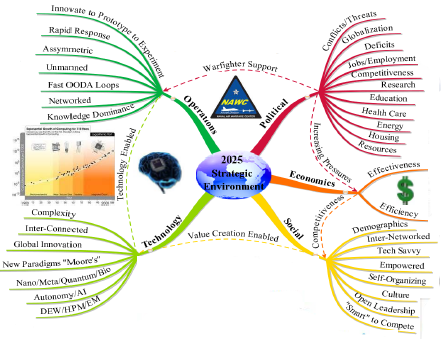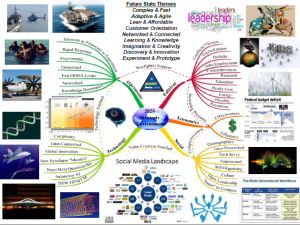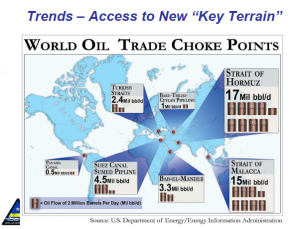NAWCAD’s Linear Planners Seek Disruptive Thinkers

Here’s the situation: The immediate tasks require real-time actions to resolve outcomes based upon conditions existing a dozen years out. The team in charge of finding the solutions represents five distinct generations of thought. We’re already behind the curve and must catch up.
Projections well beyond a standard three-year long range plan are necessary. In the words of Albert Einstein, “We can’t solve problems by using the same kind of thinking we used when we created them.”
We probably couldn’t even do that today. The speed of technology has spawned so many cultural shifts that the workforce is no longer comprised of two generations. Soon there will be five virtual generations of thought in the workforce, said Dale Moore, Director for Strategic Initiative Coordination and Execution, NAVAIR/Assistant to the NAWCAD Commander for Strategic Operations.
Think of the management dilemmas in leading that many generations, said Mr. Moore, challenging a brown-bag lunching crowd of government contractors interested in the future of naval aviation last week. The event was hosted by The Patuxent Partnership at the Wyle building in Lexington Park, Maryland.
Both sides of this accelerating equation – the need for farther-out thinking and the need to focus many different types of thinking – are imperatives facing not only naval aviation, but security worldwide.
“It’s a whole different way to think. This is the edge. It doesn’t matter if it’s business of the battlefield or anywhere.”
And we’re not there yet, Mr. Moore said. “We need to be thinking about how we’re thinking,” he challenged “Thinking about how we’re thinking and thinking about how we’re learning.”
Although Mr. Moore made no bones about how dire the immediate need was to think and learn differently, he was also emphatic that the future bodes strong for naval aviation. “The choke points around the world are on water,” he demonstrated on a PowerPoint slide.
“There is a big role for the Navy there.”
To succeed, however, the Navy must take a highly unusual step. It must foster creative and even disruptive thinking. This is non-linear thinking, not always a strong point in the engineering world, Mr. Moore suggested to the audience, winning grunts and chuckles of concurrence.
The strategic plan Mr. Moore is leading, although he concedes it is being developed by linear-thinking engineers, calls emphatically for the inclusion of that creative and even disruptive side of human knowledge. The imagination, the intuition, the insights from that side of knowledge is needed for strategic planning to succeed, he said.
“Imagination is more important than knowledge,” Mr. Moore said, quoting Einstein. “To raise new questions, new possibilities, to regard old problems from a new angle, requires creative imagination and marks real advance in science.”
Knowledge, make absolutely no mistake about the importance of this, Mr. Moore repeated and repeated and repeated. Knowledge is always going to be what strategic planning is always going to be about.
“All learning is done by association. The more you know the more you are able to learn,” he said.
NAWDAC created an admittedly engineering-styled system to begin a strategic planning process to address nearly two dozen potentialities of 2025. The PowerPoint-by-point-by-point charting is crammed with arrows and variables, any which of one could bring down a hemisphere (water, natural disasters, economics, politics, there are more) as it calls for a less linear approach. Yet, despite the linear familiarity of the strategic model, Dale Moore’s enthusiasm and intensity conveyed the importance of the mission – to come up with 2025 outcomes using all types of human thinking.
Pacing at times and always gesturing, and calling out to the well-filled conference center, “Right? Am I right?” he would punctuate his talk and ultimately won accolades from the crowd at the Patuxent Partnership’s first of an anticipated brown-bag lunch series.
“Change is old school,” he told the lunching crowd. “How do we shift paradigms as institution? Paradigms are going to shift.”

























